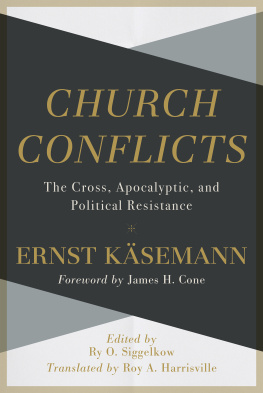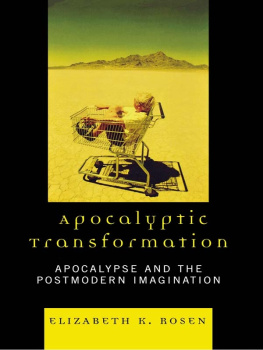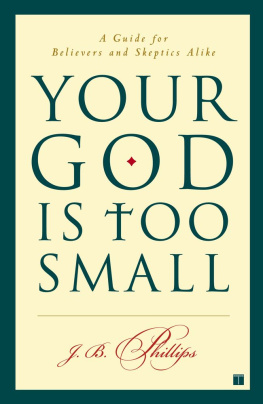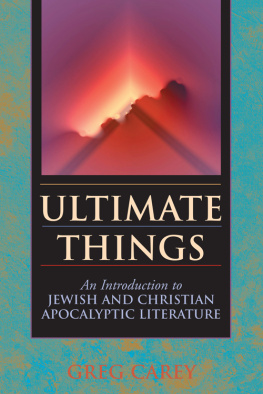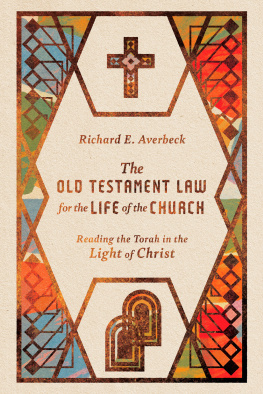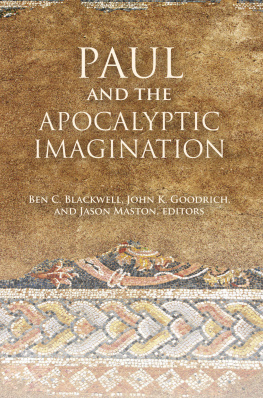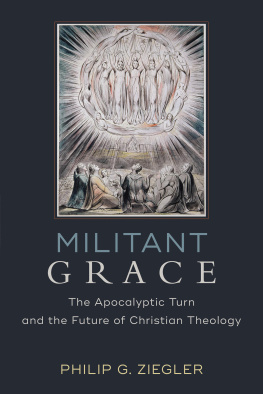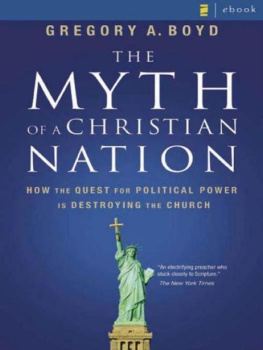Ernst Käsemann - Church Conflicts: The Cross, Apocalyptic, and Political Resistance
Here you can read online Ernst Käsemann - Church Conflicts: The Cross, Apocalyptic, and Political Resistance full text of the book (entire story) in english for free. Download pdf and epub, get meaning, cover and reviews about this ebook. year: 2021, publisher: Baker Publishing Group, genre: Religion. Description of the work, (preface) as well as reviews are available. Best literature library LitArk.com created for fans of good reading and offers a wide selection of genres:
Romance novel
Science fiction
Adventure
Detective
Science
History
Home and family
Prose
Art
Politics
Computer
Non-fiction
Religion
Business
Children
Humor
Choose a favorite category and find really read worthwhile books. Enjoy immersion in the world of imagination, feel the emotions of the characters or learn something new for yourself, make an fascinating discovery.
- Book:Church Conflicts: The Cross, Apocalyptic, and Political Resistance
- Author:
- Publisher:Baker Publishing Group
- Genre:
- Year:2021
- Rating:4 / 5
- Favourites:Add to favourites
- Your mark:
- 80
- 1
- 2
- 3
- 4
- 5
Church Conflicts: The Cross, Apocalyptic, and Political Resistance: summary, description and annotation
We offer to read an annotation, description, summary or preface (depends on what the author of the book "Church Conflicts: The Cross, Apocalyptic, and Political Resistance" wrote himself). If you haven't found the necessary information about the book — write in the comments, we will try to find it.
Ernst Käsemann: author's other books
Who wrote Church Conflicts: The Cross, Apocalyptic, and Political Resistance? Find out the surname, the name of the author of the book and a list of all author's works by series.
Church Conflicts: The Cross, Apocalyptic, and Political Resistance — read online for free the complete book (whole text) full work
Below is the text of the book, divided by pages. System saving the place of the last page read, allows you to conveniently read the book "Church Conflicts: The Cross, Apocalyptic, and Political Resistance" online for free, without having to search again every time where you left off. Put a bookmark, and you can go to the page where you finished reading at any time.
Font size:
Interval:
Bookmark:
English edition published as Church Conflicts: The Cross, Apocalyptic, and Political Resistance
2021 by Baker Publishing Group
Originally published as Ernst Ksemann, Kirchliche Konflikte , Band 1
1982 by Vandenhoeck & Ruprecht GmbH & Co. KG, Gttingen
Published by Baker Academic
a division of Baker Publishing Group
PO Box 6287, Grand Rapids, MI 49516-6287
www.bakeracademic.com
Ebook edition created 2021
All rights reserved. No part of this publication may be reproduced, stored in a retrieval system, or transmitted in any form or by any meansfor example, electronic, photocopy, recordingwithout the prior written permission of the publisher. The only exception is brief quotations in printed reviews.
Library of Congress Cataloging-in-Publication Data is on file at the Library of Congress, Washington, DC.
ISBN 978-1-4934-2723-9
Scripture quotations are from the New Revised Standard Version of the Bible, copyright 1989 National Council of the Churches of Christ in the United States of America. Used by permission. All rights reserved.
Cover
Half Title Page
Title Page
Copyright Page
Foreword by James H. Cone
Editors Introduction by Ry O. Siggelkow
Translators Preface by Roy A. Harrisville
Authors Preface (1982)
1. Aspects of the Church (1982)
2. Early Christian Conflicts over the Freedom of the Congregation (1979)
3. On the Ecclesiological Use of the Key Words Sacrament and Sign (1974)
4. Jesus Christ Frees and Unites (1975)
5. The Presence of the Crucified (1967)
6. The Place That Cannot Be Surrendered (1977)
7. On the Way toward Abiding (1977)
8. The Appeal to Reason (1977)
9. Guests of the Crucified (1979)
10. Presence of Mind (1969)
11. Love, Which Rejoices in the Truth (1972)
12. The Proclamation of the Cross of Christ in a Time of Self-Deception (1974)
14. The Healing of the Possessed (1978)
15. Meaning and Problematic of the 1981 Kirchentag Motto (1980)
16. The Eschatological Royal Rule of God (1980)
17. Where Eternal Life Begins on Earth (1981)
18. What I, as a German Theologian, Unlearned in Fifty Years (1981)
Scripture Index
Subject Index
Cover Flaps
Back Cover
J AMES H. C ONE (19382018)
This foreword consists of a compilation of personal email exchanges between James Cone and the volume editor, Ry Siggelkow. It is printed posthumously with Cones expressed permission communicated before his death on April 28, 2018. (Email correspondences dated October 11, 2017, and March 19, 2018.)
I am very thankful for the invitation to write a reflection on my relationship with Ernst Ksemann. I really wish someone had asked me to write about him about twenty years ago when I had more time and energy to reflect on Ksemann in a manner that he deserves. Even though I would love to do it, please accept my deepest regrets for not being able to write a serious reflection at this time for a man I admired very much.
Ksemann was a very distinguished scholar. I have read extensively in his work and appreciate him very much. His book Jesus Means Freedom was one of the first books that excited me about him, even though I knew and had read his work about the new quest for the historical Jesus, challenging some of the assumptions of his teacher Rudolf Bultmann. As I look back, I can see how his challenge to Bultmann led directly to his affirmation of liberation theology and my work.
We first met in 1973 when I lectured at the University of Tbingen and had dinner with him and his wife during my stay there. We had extended conversations about his daughter, who at that time was in Argentina. I never will forget the dinner we had together in his house with his wife as they told me about their daughter among the rebels in Argentina. Ksemann told me that he wrote about the meaning of liberation theology, but his daughter lived it. Both he and his wife expressed grave concern for their daughters life. Unfortunately, a few years later she was killed, becoming a martyr for the cause of justice. We also talked a lot about black liberation theology, and I appreciated deeply his words of encouragement to me. Among all the German theologians, or Europeans for that matter, whom I came to know when I began writing, Ksemann was the only one who understood me. He was a man of my own mind and heart and wrote concretely about what I was trying to express in my own situation.
R Y O. S IGGELKOW
W hat you hold in your hands is a translation of the first volume of Ernst Ksemanns Kirchliche Konflikte , a collection of essays, lectures, Bible studies, meditations, and sermons spanning the late 60s to the early 80s, compiled and published in 1982.
The Early Years and Theological Studies
Ernst Ksemanns life spanned nearly the entire twentieth century. While studying at Marburg, Ksemann learned more about the dialectical theology movement, working his way through the writings of Kierkegaard, Barth, and Heidegger. In his fifth semester he left for Tbingen for further study under Adolf Schlatter.
The Pastoral Years and the Resistance against Nazism
After completing his initial theological studies, Ksemann took up a position as a teaching vicar in Zieverich, about a hundred kilometers south of his hometown of Essen. While there he completed his first theological examinations at nearby Koblenz, and by 1931, under the direction of Bultmann, he submitted his doctoral dissertation on the theme of the worldwide body of Christ. Along with many others, Ksemann would cast his vote for Adolf Hitler and join the right-wing Hitlerite movement of German Protestantism, the Deutsche Christen (German Christians). Before long, however, Ksemann grew mistrustful of the regime after Hitler intervened on behalf of a criminal storm trooper in Silesia. But Ksemann admits that he still navely thought that Germany could wait until the next election, four years later, to vote Hitler out of office.
Ksemann changed his mind when, in the summer of 1933, his congregation witnessed a dramatic increase in membership of the Deutsche Christen (from four to forty-five members). On the Day of Repentance and Prayer on November 15, 1934, Ksemann, along with his colleagues and friends from the Confessing Church, publicly dismissed before the altar the forty-five members of the Deutsche Christen from membership in his congregation and presented forty-five members of the Confessing Church to replace them.
In response to the planned action, a group of Nazis from Gelsenkirchen had prepared a plan of their own. As the service was about to commence, a group of Nazis formed in front of the church, determined to stop the service from happening by having the pastors flogged out of the church. A group of women in the congregationthe backbone of the congregation, in Ksemanns wordsformed the key opposition against the Nazi group. While the Nazis did not threaten the group of women violently, they promised to participate aggressively if the situation demanded it. By this point, many curious onlookers from all ages and walks of life began to gather in front of the church to see what was going on. In Ksemanns words, the front of the church had been transformed into a battle arena. In response to what appeared to be an impending riot, a man named Graf Stosch, a Nazi advocate for church affairs in the district of Westphalia-North, appeared with fifty policemen and ordered everyone to clear the area in the name of the state. Stosch had earlier informed Ksemann and others preparing for the service that he had received a commission from Berlin to arrest the pastors and prevent the service from taking place. In response to his query as to whether they would still continue the service, the Confessing Church pastors answered, Yes. Stosch said that he would ensure that the pastors would be protected, and he informed Berlin that he would secure law and order. Although he was not sure what had motivated Stosch to allow the service to continue, Ksemann found this action very moving, going so far as to say, The climax of our struggle is bound up with him.
Font size:
Interval:
Bookmark:
Similar books «Church Conflicts: The Cross, Apocalyptic, and Political Resistance»
Look at similar books to Church Conflicts: The Cross, Apocalyptic, and Political Resistance. We have selected literature similar in name and meaning in the hope of providing readers with more options to find new, interesting, not yet read works.
Discussion, reviews of the book Church Conflicts: The Cross, Apocalyptic, and Political Resistance and just readers' own opinions. Leave your comments, write what you think about the work, its meaning or the main characters. Specify what exactly you liked and what you didn't like, and why you think so.

